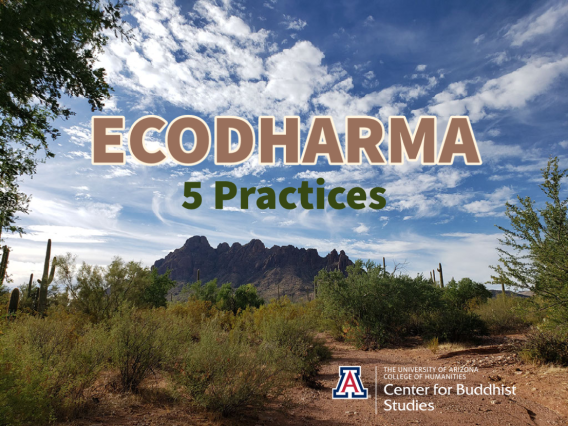
Hannah Greene is a Fellow at the Center for Buddhist Studies at the University of Arizona and a practitioner of Insight Meditation and the Alexander Technique, a Western mind-body awareness technique.
In our seventh Community Wellness Newsletter, we explore the topic of ecodharma, the environmental movement inspired by Buddhist ethics. As a vegetarian and avid hiker, I find many opportunities to invite ecodharma principles into my daily rhythm. I especially enjoy introducing my five-year-old son to the wonders of nature in the Sonoran Desert, where wildlife abounds and the effects of climate change (drought, wildfires, insect extinction) feel palpable and immediate. Here are a few ideas for ways that you can introduce ecodharma practices into your daily life.
-
Mountain Meditation => A beautiful way to introduce a sense of wonder for the natural world into your seated meditation practice, the Mountain Meditation is a visualization exercise in which the practitioner first imagines and then becomes one with a treasured mountain. As you explore your mountain, notice how the changing seasons affect the climate on your slopes and how the foot traffic, recreation, or any resource extraction may threaten your health and the life sustained by your alpine ecosystem.
-
Click here for a sample script of the meditation or listen to American mindfulness teacher John Kabat-Zinn guiding the practice.
-
Mindful Consumption => Take stock of what you buy and consume each week and make a commitment to eliminate unnecessary and ecologically harmful products. Buy more local organic fruits and vegetables, only buy as much food as you need, avoid plastic packaging, bring your own bags to the grocery store, seek out used household items (couches, kitchenware, etc.), drive less, take the bus or bike, recycle or give away unwanted items.
-
Many monasteries participating in the Khoryug movement in the Himalayas have installed solar panels, practice organic farming, and compost their food waste.
-
Awareness in Nature => Whether you have an hour for formal walking practice or just 5 minutes to walk in between meetings, practicing outside can be a powerful way to cultivate a sense of wonder and appreciation of the intrinsic value of the natural world. It is also good for your health. Forest bathing, or shinrin-yoku, a concept that arose in Japan in the 1980s, is a form of nature therapy for physiological and psychological health. Try walking slowly and silently in a park or on a hiking trail. Using all five senses, pay attention to what you notice in your environment: a cool breeze on your skin, the sound of bird song, the feeling of grass or rocks under your feet, the heat of the sun or its absence on a cloudy day. If you have children in your life, help them to explore their surroundings with gentle curiosity. What kinds of animals and plants do they see? What do the animals eat, and how do the plants survive in your local climate? What are natural predators/threats and how has human development affected them?
-
Members of Upaya Tucson, a Zen Sangha, explore eco-dharma through hikes and practice in nature: Visit their website to learn more.
-
Meatless Monday => Reducing meat and dairy consumption, or going completely vegetarian/vegan, benefits the planet by reducing greenhouse gases like methane and preserving land and water resources. Mahayana Buddhists also practice vegetarianism for moral reasons, as part of adherence to the first precept to not kill sentient beings. Try cooking a vegetarian version of a familiar family favorite like lasagna, stir fry, or burgers. In place of meat, substitute protein-rich ingredients like beans, tofu, or cauliflower. Recipe ideas are plentiful on the internet. You can start with the Meatless Monday website.
-
Many Buddhist temples in Asia and the West offer simple, healthy vegetarian food to residents and guests. Taiwan in particular is famous for its vegetarian restaurants, which boast inviting buffets of tasty plant-based dishes.
-
Work for Systemic Change => There are many ways large and small that individuals can apply Buddhist ethics in the fight to save the planet. Organize your sangha to plant trees in areas of your town or city that lack greenery. Write to your local city councilmember and ask them to develop a Climate Action Plan. Support the Indigenous tribe or nation on whose lands you live in their efforts to protect water resources or prevent ecological destruction from mines or construction. Join a national or international organization and lobby members of Congress by asking them to support climate action legislation.
-
In their efforts to protect the Mekong River in Asia, the World Wildlife Fund engaged the supreme patriarch of Theravada Buddhism in Cambodia to be ambassador for the Irrawaddy dolphin. (Ecology, Ethics and Interdependence, p. 244)

